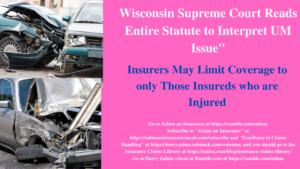Wisconsin Supreme Court Reads Entire Statute to Interpret UM Issue


State Farm Mutual Automobile Insurance Company (State Farm) asked the Wisconsin Supreme Court to reverse the court of appeals decision reversing the circuit court’s grant of summary judgment in favor of State Farm. In Elliot Brey and Estate of Ryan B. Johnson v. State Farm Mutual Automobile Insurance Company, Channing H. Mathews, Craig A. Mathews and Sentry Insurance, A Mutual Company, 2022 WI 7, No. 2019AP1320, Supreme Court of Wisconsin (February 15, 2022) the uninjured Elliot sued for the loss of his uninsured father in a car neither owned nor used by Elliot nor involved in the accident.
The trial court determined the State Farm automobile liability insurance policy issued to Elliot Brey’s mother and her husband (the Policy) did not provide underinsured motorist (UIM) coverage to Elliot Brey (Brey) for the death of his father, Ryan B. Johnson (Johnson), in an automobile accident.
The Policy limited UIM coverage to compensatory damages for “bodily injury . . . sustained by an insured[.]” Brey was an insured under the Policy, but Johnson was not. The circuit court ruled Brey could not recover under the policy because Brey did not sustain bodily injury.
State Farm contendeed that Wis.Stat. § 632.32(2)(d) does not require insurers to extend UIM coverage to an insured for bodily injury or death suffered by a person who was not insured under the Policy.
BACKGROUND
Johnson died from injuries sustained in an automobile accident in 2015, leaving behind his minor son, Elliot Brey. State Farm insured Brey as a resident relative under the Policy issued to Hannah and Jake Brey, Brey’s mother and her husband, covering a 2007 Honda CRV. That vehicle was not involved in the accident. Johnson, who was a passenger in a vehicle driven by Channing H. Mathews, was not insured under any State Farm policy.
The UIM coverage provisions of the Policy provided that an insured must have sustained bodily injury caused by an accident involving an underinsured motor vehicle in order to collect compensatory damages.
Both Brey and State Farm moved for summary judgment. Brey acknowledged the terms of the Policy precluded coverage, but argued the Policy’s requirement that an insured sustain injury was contrary to Wis.Stat. § 632.32(2)(d) and therefore void and unenforceable. Section 632.32 is sometimes called the “Omnibus Statute” because it sets the minimum requirements all motor vehicle insurance policies in Wisconsin must satisfy.
The circuit court granted summary judgment in favor of State Farm based on the language of the Policy. The court of appeals reversed and remanded.
DISCUSSION
The parties do not dispute that the Policy bars coverage for Brey’s wrongful death claim because the UIM coverage provisions require an insured to sustain bodily injury, and Johnson was not an insured under the Policy.
The Supreme Court’s interpretation of Wis.Stat. § 632.32(2)(d) began, as with all statutory or contract interpretation, with the language of the statute. If the meaning of the language is plain, its inquiry ordinarily ends. Importantly, ascertaining the plain meaning of a statute requires more than focusing on a single sentence or portion thereof. A statute’s context and structure are critical to a proper plain-meaning analysis.
If statutory language is plain, courts must enforce it according to its terms, but oftentimes the meaning or ambiguity of certain words or phrases may only become evident when placed in context, so when deciding whether language is plain, courts must read the words in their context and with a view to their place in the overall statutory scheme. Properly applied, the plain-meaning approach is not “literalistic”; rather, the ascertainment of meaning involves a “process of analysis” focused on deriving the fair meaning of the text itself.
The court of appeals’ conclusion that Wis.Stat. § 632.32(2)(d) contains an “unambiguous statement” prohibiting State Farm from conditioning coverage on an insured sustaining bodily injury reflects a literalistic approach to statutory interpretation. That court reasoned: (1) Brey is an “insured”; (2) who is “legally entitled to recover damages”; (3) because he has a wrongful death claim against the “owner or operator of an underinsured motor vehicle…” he was entitled to claim against State Farm.
The Supreme Court, on the other hand, concluded that the Court Of Appeals erred by strictly construing the statutory definition in isolation rather than interpreting it in the context of the Omnibus Statute’s pertinent text as a whole. In doing so it rejected the hyper-literal approach.
Statutory interpretation centers on the “ascertainment of meaning,” not the recitation of words in isolation. By declining to address statutory context, the Court Of Appeals erroneously confined its statutory analysis to the definition in Wis.Stat. § 632.32(2)(d). It should have instead “interpreted [the definition] in the context in which it is used; not in isolation but as part of a whole; in relation to the language of surrounding or closely-related statutes; and reasonably, to avoid absurd or unreasonable results.” Perhaps no failure by a court when interpreting a statute or contract is more common than the failure to follow the whole-text canon, which calls on the judicial interpreter to consider the entire text, in view of its structure and of the physical and logical relation of its many parts.
The statutory context and structure indicates UIM coverage exists only when an insured suffers bodily injury or death. The reason to doubt a literal meaning of a statute is that it clashes with related statutes. The Supreme Court also concluded that read in the context of these paragraphs, § 632.32(2)(d) does not require insurers to extend UIM coverage when no insured has suffered bodily injury or death.
Interpreting § 632.32(2)(d) to require UIM coverage even if no insured person was injured conflicts with § 632.32(5)(f) and (g), which permit limits on coverage for insured persons who suffer bodily injury. The Supreme Court noted: “Interpreting § 632.32(2)(d) to apply anti-stacking provisions only to injured insureds while allowing uninjured insureds to circumvent them would be nonsensical.”
Wrongful Death Claims Under UIM/UM Policies
In order for a wrongful death claim to exist, the decedent must have had a valid claim for damages against the defendant at the time of his death. At the time of his death, Johnson could not have recovered damages under the UIM coverage provisions of the Policy because he was not an insured. Consequently, Brey cannot maintain a derivative action against State Farm.
Nothing in Wis.Stat. § 632.32(2)(d) precludes insurers from affording coverage to only those insureds who are injured in an auto accident.
CONCLUSION
Therefore, the trial court properly granted State Farm’s motion for summary judgment and the court of appeals erred in reversing it. The Policy affords UIM coverage to only an insured who sustained bodily injury caused by an accident involving an underinsured motor vehicle.
Brey’s father was not insured under the Policy. While Brey is an insured under the Policy, he was not involved in the accident in which his father was killed and therefore sustained no bodily injury. Wisconsin Stat. § 632.32(2)(d) plainly does not preclude an insurer from limiting UIM coverage to insureds who sustain bodily injury or death.
Although it is often said that “for every wrong there is a remedy” there is not insurance for every wrong. Stretching the language of a statute to revise the wording of an insurance contract entered into freely and issued in accordance with state statute is just plain wrong. The Supreme Court of Wisconsin, in a lengthy analysis, did the right thing and refused to rewrite the policy to help a child obtain money from an insurer that did not agree to indemnify him for a loss where neither he nor an insured of the policy was injured.

© 2022 – Barry Zalma
Barry Zalma, Esq., CFE, now limits his practice to service as an insurance consultant specializing in insurance coverage, insurance claims handling, insurance bad faith and insurance fraud almost equally for insurers and policyholders.
He practiced law in California for more than 44 years as an insurance coverage and claims handling lawyer and more than 54 years in the insurance business.
Subscribe to “Zalma on Insurance” at https://zalmaoninsurance.locals.com/subscribe and “Excellence in Claims Handling” at https://barryzalma.substack.com/welcome.
You can contact Mr. Zalma at https://www.zalma.com, https://www.claimschool.com, zalma@claimschool.com and zalma@zalma.com . Mr. Zalma is the first recipient of the first annual Claims Magazine/ACE Legend Award.
You may find interesting the podcast “Zalma On Insurance” at https://anchor.fm/barry-zalma; you can follow Mr. Zalma on Twitter at; you should see Barry Zalma’s videos on https://www.youtube.com/channel/UCysiZklEtxZsSF9DfC0Expg/featured; or videos on https://rumble.com/zalma. Go to the Insurance Claims Library – https://zalma.com/blog/insurance-claims–library/ The last two issues of ZIFL are available at https://zalma.com/zalmas-insurance-fraud-letter-2/
Like this:
Loading…







